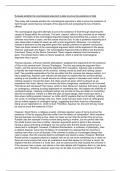Evaluate whether the cosmological argument is able to prove the existence of God
This essay will evaluate whether the cosmological argument is able to prove the existence of
God through examining key concepts of the argument and evaluating the key criticisms
offered.
The cosmological argument attempts to prove the existence of God through observing the
causes of things within the universe. The term ‘cosmos’ refers to the universe as an ordered
system. The basis of the cosmological argument states that everything has a cause, so the
universe must have a cause, and this cause must be God. It uses a posteriori reasoning as it
uses observation instead of reason as with a priori arguments. Moreover, it is inductive
instead of deductive as the argument goes from specific premises to general conclusions.
There are three variants of the cosmological argument which will be explored in this essay:
Thomist, Leibnizian and Kalam. The Cosmological Argument links to Ethics and the Divine
Command Theory as the Divine Command Theory argues whatever God commands is
good. The ethical theory relies on God’s existence, which is what the Cosmological
argument tries to prove.
Thomas Aquinas, a Roman Catholic philosopher, explained five arguments for the existence
of God in his seminal work ‘Summa Theologica’. The first way being the argument from
motion, and the second way being the argument from causation. Aquinas uses a posteriori
to identify two main features of the universe: nothing moves by itself and nothing causes
itself. Two possible explanations for this are either that the universe has always existed, or it
had a beginning. Aquinas uses reductio ad absurdum to explain that the universe always
existing is not possible as it would assume an infinite regress of causation and motion, but if
nothing caused or moved this chain, the chain would not exist, which is absurd as we
experience this chain. Hence, the universe did have a beginning, explained by an Unmoved
First Mover and Uncaused First Cause, which is God. Moreover, Aquinas’ third way is based
on contingency, referring to being dependent on something else. He explains the shelf-life of
contingent beings, meaning contingent beings live and die as they are reliant on something
else for its existence. If there is a finite life span of these beings, there must have been a
time where nothing existed, however ‘ex nihilo nihil fit’ explains that out of nothing, nothing
can come. If contingent beings exist now, there could not have been a time of nothingness
and an infinite regress of contingent beings, suggesting that there must be a Necessary
being we are dependent on, which is God. Therefore, Aquinas 1st, 2nd and 3rd way could
be used to prove the existence of God.
However, David Hume, a religious sceptic, criticises Aquinas’ ways of trying to prove the
existence of God by arguing that they suffer from the fallacy of composition, which explains
that just because one thing is true, does not mean we can infer the whole thing to be true.
Russell uses the example of every human being having a mother, but we cannot infer that
the whole human race has a mother. Aquinas’ arguments point to parts of the universe
having a cause and being contingent, but we cannot infer that the whole universe has a
cause and is contingent. However, Professor Reichenbach, a professor of philosophy, tries
to defend Aquinas’ ways from the fallacy of composition by arguing that the universe is
nothing more than a sum of its parts: if the universe is made up of contingent beings that
need a cause, then the universe itself is contingent and needs a cause. However, Bertrand
Russel points to quantum physics to explain how we do not know everything has a cause as
there are some events that occur at a subatomic level that appear to not have a cause. He
explains that the universe is a ‘brute fact’, and we cannot prove what caused the universe or
if the universe has a cause, and claims in his radio debate with Copleston that it is ‘just there
and that is all’. Therefore, Aquinas’ ways may not be able to prove the existence of God.




